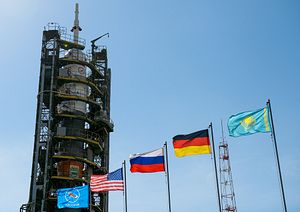The U.S. space program should seek to expand its cooperation with China, a new report has found. The report by the National Research Council, titled “Pathways to Exploration – Rationales and Approaches for a U.S. Program of Human Space Exploration,” laid out recommendations for the future of U.S. space agency NASA. Congress ordered the report in 2010; the results of the four-year investigation were released Wednesday.
NASA is banned from cooperating with China on projects under a 2011 appropriations law that states:
None of the funds made available by this Act may be used for the National Aeronautics and Space Administration (NASA) or the Office of Science and Technology Policy (OSTP) to develop, design, plan, promulgate, implement, or execute a bilateral policy, program, order, or contract of any kind to participate, collaborate, or coordinate bilaterally in any way with China or any Chinese-owned company unless such activities are specifically authorized by a law enacted after the date of enactment of this Act.
The ban reflects congressional unease about high-tech cooperation with China in any field. There are also restrictions limiting the extent of mil-to-mil cooperation with China as well as a ban on certain high-tech exports. Frank Wolf, the Representative behind the anti-China clause, explained his reasoning. “We don’t want to give them the opportunity to take advantage of our technology, and we have nothing to gain from dealing with them,” he said back in 2011. He also cited moral concerns over working with the Chinese government: “Would you have a bilateral program with Stalin?”
Scientists, however, have been far less supportive of the ban. Last October, when it came to light that Chinese scientists had been banned from attending a NASA conference, the news sparked outrage and boycotts among American scientists. Geoff Marcy, a U.S. scientist considered to have been on the short-list for the 2013 Nobel Prize in physics, called the ban “completely shameful and unethical.” NASA eventually backtracked and re-invited the Chinese scientists, in part after Rep. Wolf said that NASA was not prohibited by law from interacting with individual Chinese citizens.
Though Wolf argued the law had been misinterpreted, he stood firm behind the blanket ban on cooperation between NASA and Chinese government entities. However, the backlash over the conference drew new attention to the ban, with many speaking out against it. Since then, there have been signs NASA is seeking a change. And such a change may be possible: with Rep. Wolf announcing he will not seek reelection this year, the ban on NASA-China cooperation will lose its strongest supporter.
In January, officials from China’s National Space Administration were included in an international meeting hosted by the U.S. State Department. Because funding was provided by State, not NASA, it did not violate the 2011 law. The meeting was a rare opportunity for U.S. and Chinese officials to talk about potential space cooperation. Still, NASA Administrator Charles Bolden cautioned against too much optimism: “Human spaceflight is not something that’s going to happen with [the] U.S. [and] China in the foreseeable future, because we are forbidden from doing that by law,” he reminded reporters.
Now, the NRC’s report officially calls for a reexamination of the 2011 ban. “This policy, while driven by congressional sentiment, denies the U.S. partnership with a nation that will probably be capable of making truly significant contributions to international collaborative missions,” the report said. “Given the rapid development of China’s capabilities in space, it is in the best interests of the United States to be open to its inclusion in future international partnerships,” it continued.
The report also recommended that NASA turn its focus to sending a manned mission to Mars, calling the red planet “the horizon goal for human space exploration.” Yet the NRC cautioned that this goal could not be reached without more extensive international cooperation. “We’re really talking about international collaboration of a different scale than what has been conducted in the past,” Jonathan Lunine, co-chair of the NRC panel, told reporters.
Even while the NRC highlighted the need for international efforts, Russia is drastically scaling back its space cooperation with the U.S. in response to Western sanctions stemming from the Ukraine crisis. Russia has announced that it will withdraw from the International Space Station in 2020, and will cease selling the RD-180 engine that currently powers the U.S. Atlas 5 rocket.
With Russia withdrawing (at least temporarily) from space cooperation with the U.S., cooperation with China becomes all the more vital. “Current federal law preventing NASA from participating in bilateral activities with the Chinese … reduces substantially the potential international capability that might be pooled to reach Mars,” the report found.

































